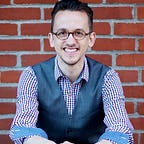An Elegy for Song
“Put not your trust in princes, in a son of man in whom there is no help.
When his breath departs he returns to his earth; on that very day his plans perish.” Psalm 146: 3–4
It took half a year for me to fully comprehend what has been lost in the world of music during the Covid-19 pandemic. I can mark the day, 30 September, when I sat down to plan what an All Souls Vespers would look like that the reality came crashing down upon me. For the first time since limits on gathering were put into place, I attempted to plan something without limit, let my creativity soar and began to plan a service which would truly put our congregation into the Divine Presence through the best music I could muster. As I searched for possible music, I put on a recording of Voces8 singing Stephen Paulus’s The Road Home. This particular piece is a favourite among many choirs and the rich textures of the Voces8 ensemble put me in mind of the ideals I always try to hold of music within Catholic liturgy.
The Voces8 ensemble was the last concert I heard before what one might call “The Ending.” Voces8 performed in a northwest suburb of the Twin Cities. Not only did they perform in a visually and acoustically beautiful Catholic Church, they were on tour doing education and outreach to youth ensembles, in this case a superb and lively high school music program. Hundreds of high school students sang with these eight professionals and enveloped those of us who were there to listen in an aural experience of deep beauty. 224 days later, I thought back to that evening and wept for all that had been lost. I wept for all the beautiful music never sung, the communities that could never be what they wished to be, and the future that I could not see.
All human beings find change difficult. It might be thrilling in some circumstances whereas others are more heart breaking but, inevitably, change demands some kind of loss and some kind of demolition of an old comfortable structure. Human beings are also made to transform into something better. We are created for a higher ideal, only damaged by the fall of original sin. The decisions we make lead us away from this ideal and damage ourselves and others, or they build up the society around us and thus make us better versions of ourselves.
Within the refining fire of change, human beings face the choice going one direction or another. Our innate selves desire the light but too often we are distracted by the glitter and instant salve of a darkness which cannot satisfy. The real change does not directly lie in the first choice of something good or something evil. Humans will always choose the dark at one point or another. We face the ultimate choice of staying in the dark or getting up and turning toward the light. Each of these decisions becomes a small resurrection in our souls. We have the chance to become better and to transform the dark into the light. This is where change destroys what is bad and grows what is good. This is change at its best. It is up to us to choose to make change something virtuous. It is up to us to make change a reflection of the greater Resurrection which has brought us our salvation.
The moment of detachment and submission to a greater change is where the real work begins. By choosing the light, by choosing to allow ourselves discomfort for the fulfilment of the promise of the Resurrection, we begin to work on something completely beyond ourselves. A plan beyond our understanding becomes intermingled in our lives and the lives of every person who makes the same conscious decision. We dream, love, work, and accomplish so much but in the release of any true expectation we find in the pains and disappointments, the peace of God who truly sees what will satisfy his creatures beyond their wildest dreams. At the same time, we find the Kingdom of God for which we are all yearning, a kingdom of true justice and mercy without the pain of the fall and grounded in the glory of the Resurrection.
Humankind is God’s greatest creation. As complex and beautiful as we are, we are also simple when placed in comparison to the intricacy of the Divine. Choral singing prefigures this supernatural reality. Each chorister submits and gives of themselves into the greater body with one supreme goal in mind. All singers sacrifice to each other in order to produce something more beautiful than anything an individual could accomplish on their own. Each singer knows this reality unconsciously and deeply; it is what brings them back to choir season after season. In this time where choirs cannot meet, we reflect on this choral reality and answer the call to work towards a Divine beauty in the human creation through every part of our world.
